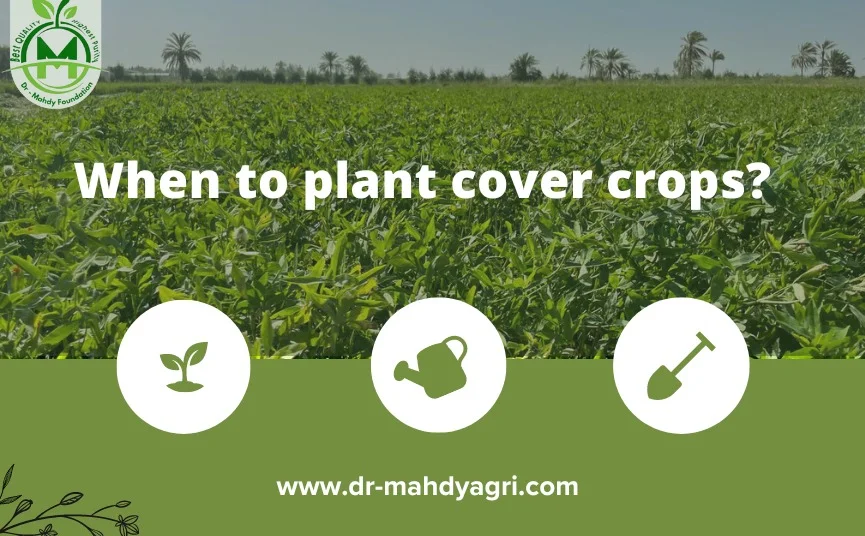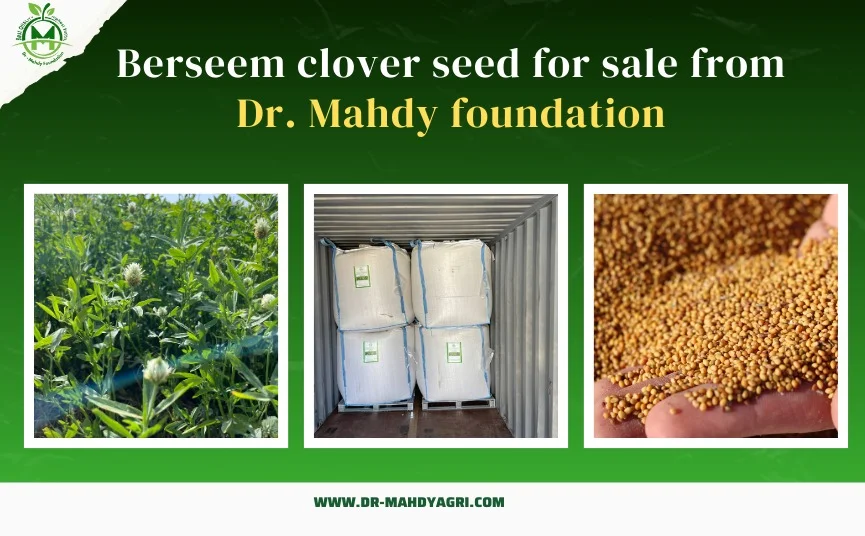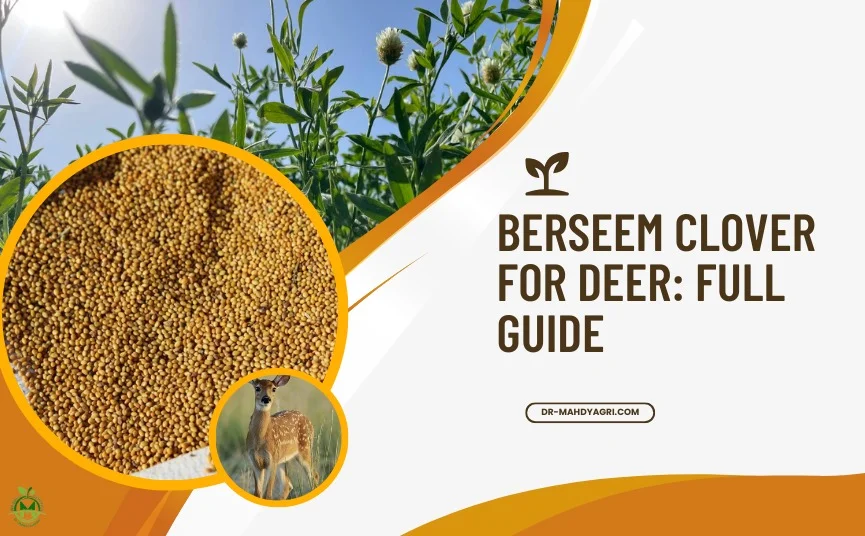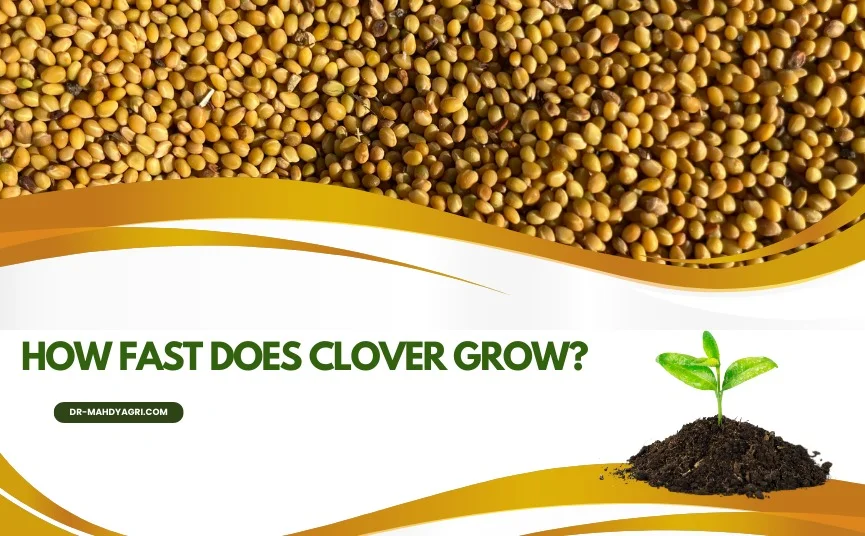

Berseem clover, also known as Egyptian clover (Trifolium alexandrinum), is a leguminous forage crop widely cultivated for animal feed. Here are some key characteristics and benefits with Dr. Mahdy Best seller of Egyptian Berseem Clover seeds in US and UK.
Introduction to Berseem Clover
Berseem Clover is a popular legume that belongs to the Trifolium genus. It is a winter annual plant that thrives in cooler climates and is widely cultivated for its high-quality forage. This versatile crop has gained much attention in recent years due to its exceptional nutritional value and ability to fix nitrogen in the soil. berseem clover as cover crop is mainly used as a forage crop but also serves as a valuable cover crop, green manure, and fodder for livestock. Its quick growth rate and palatability make it a favorite among farmers and ranchers alike. With proper management, Berseem Clover can provide multiple benefits to the agricultural industry and help improve soil health.
What is Berseem Clover and its benefits
berseem clover balady is a versatile legume that offers numerous benefits to farmers and ranchers. It is a winter annual plant belonging to the Trifolium genus. Berseem Clover is highly valued for its high-quality forage, making it an excellent choice for livestock feed. It is also known for its ability to fix nitrogen in the soil, improving soil fertility and reducing the need for synthetic fertilizers. This crop has a rapid growth rate and is highly palatable to animals, making it an ideal choice for grazing and hay production. Berseem Clover can be used as a cover crop, preventing soil erosion and suppressing weeds. Its deep root system helps improve soil structure and water retention. Overall, Berseem Clover is a valuable crop that promotes sustainable agriculture practices and enhances soil health.
Conditions for growing Berseem Clover
Berseem Clover thrives in cool-season climates, making it suitable for regions with mild winters and moderate temperatures. It prefers well-drained soils but can tolerate a range of soil types, including sandy or clay soils. Berseem Clover requires a pH level between 6.0 and 7.0 for optimal growth. It is important to note that this crop does not tolerate drought, so sufficient irrigation is necessary, especially during dry periods. When it comes to sunlight, Berseem Clover prefers full sun but can also tolerate partial shade. It is important to select a location with good air circulation to prevent the buildup of moisture and reduce the risk of disease. Overall, Berseem Clover requires the right combination of temperature, soil conditions, and water availability for successful growth.
Growing Berseem Clover
Berseem Clover is a versatile crop that can be grown in various climates and soil types. Before planting, it is essential to prepare the soil properly by removing any debris and loosening it to allow for adequate root penetration. The recommended seeding rate for Berseem Clover is approximately 20-25 pounds per acre. It should be sown in late summer or early fall when the soil is warm and moist.
To achieve successful germination, it is important to ensure good seed-to-soil contact. This can be achieved by broadcasting the seeds evenly across the prepared area and lightly tamping them into the soil. Berseem Clover requires consistent moisture during its establishment phase, so regular watering is necessary.
Once established, Berseem Clover requires minimal maintenance but still benefits from occasional irrigation during dry periods. Fertilizing with a balanced fertilizer, high in phosphorus and potassium, can promote healthy growth and enhance nitrogen fixation.
Pruning or mowing Berseem Clover during its growth period helps to stimulate lateral branching and increase overall biomass production. It is also advisable to avoid overgrazing, as it can weaken the plants and reduce their productivity.
Overall, growing Berseem Clover requires attention to proper planting techniques, regular watering, and occasional fertilization to ensure its healthy growth and development.
Soil preparation and planting methods
To ensure successful growth, Berseem Clover requires proper soil preparation and planting methods. The first step is to remove any debris from the area where the clover will be planted. This allows for a clean and clear space for the seeds to germinate.
After clearing the area, it is important to loosen the soil. This can be done by tilling or using a garden fork to break up any compacted soil. Loosening the soil allows for better root penetration and nutrient absorption.
Once the soil is prepared, it is time to sow the Berseem Clover seeds. It is recommended to use a seeding rate of approximately 20-25 pounds per acre. The seeds should be evenly spread across the prepared area to ensure proper coverage.
To improve seed-to-soil contact, lightly tamp the seeds into the soil using a roller or press. This helps to ensure better germination rates and promotes healthy growth.
After planting, regular watering is crucial to keep the soil moist and aid in seed germination. Watering should be consistent during the establishment phase and occasional irrigation may be needed during dry periods.
Following these soil preparation and planting methods will contribute to successful growth and establishment of Berseem Clover.
Read More:
Berseem Clover for Cattle
berseem clover seed non gmo
berseem clover scientific name
berseem clover annual or perennial
Watering and fertilizing techniques
Berseem Clover requires regular watering to promote healthy growth. It is important to keep the soil consistently moist during the establishment phase. Occasional irrigation may be required during dry periods to prevent the soil from drying out.
When it comes to fertilizing, it is recommended to conduct a soil test before applying any fertilizers. This will help determine the specific nutrient needs of the soil. Generally, Berseem Clover benefits from a balanced fertilizer that contains nitrogen, phosphorus, and potassium.
Fertilizers should be applied according to the soil test recommendations. It is best to apply fertilizer in early spring or fall when the clover is actively growing. Slow-release fertilizers are ideal as they provide a steady supply of nutrients over time.
It is important not to over-fertilize Berseem Clover, as excessive nitrogen can lead to lush foliage but reduced seed production. Regular monitoring of nutrient levels and adjusting fertilization accordingly is key to maintaining optimal growth.
By following proper watering and fertilizing techniques, growers can ensure that their Berseem Clover receives the necessary hydration and essential nutrients for healthy and abundant growth.
Managing Berseem Clover Growth
Berseem Clover is a fast-growing plant that requires proper management to ensure its optimal growth. Managing the growth of Berseem Clover involves several key practices that contribute to its overall health and productivity.
One important aspect of managing Berseem Clover growth is weed control. Regular monitoring and timely removal of weeds are necessary to prevent them from competing with the clover for essential nutrients, water, and sunlight.
To maintain healthy stands of Berseem Clover, it is crucial to provide adequate moisture. This includes regular watering during dry periods and ensuring that the soil remains consistently moist during the establishment phase.
Proper fertilization is another important factor in managing Berseem Clover growth. Conducting a soil test can help determine the specific nutrient needs of the soil, allowing growers to apply fertilizers accordingly. It is essential not to over-fertilize, as excessive nitrogen can lead to lush foliage but reduced seed production.
Regular mowing or grazing can help manage the height and density of Berseem Clover. This prevents it from becoming too tall and reduces competition with other plants.
Incorporating rotational grazing or cutting practices can also help maximize the longevity and productivity of Berseem Clover stands.
By implementing these management practices, growers can ensure the healthy growth and longevity of their Berseem Clover, ultimately maximizing its benefits for agriculture and livestock purposes.
Weed control and pest management
Weed control and pest management are essential aspects of managing Berseem Clover growth. Weeds can compete with the clover for vital nutrients, water, and sunlight, impacting its overall health and productivity. Regular monitoring and timely removal of weeds are necessary to prevent them from overtaking the clover fields.
Pest management is also crucial in ensuring the success of Berseem Clover. Common pests such as aphids, mites, and beetles can damage the clover plants and reduce their vigor. Integrated Pest Management (IPM) practices, including proper identification of pests and the use of natural predators or insecticides when necessary, help maintain a healthy balance.
Regular scouting and implementing appropriate pest control measures can effectively manage pests and reduce potential crop damage. Additionally, practices such as crop rotation and planting resistant varieties can help mitigate pest issues in Berseem Clover fields.
By effectively controlling weeds and pests, growers can ensure the optimal growth and productivity of Berseem Clover, resulting in healthier stands and better agricultural outcomes.
Disease prevention and treatment
Disease prevention and treatment are vital aspects of managing Berseem Clover growth. Regular monitoring and prompt action can help prevent the spread of diseases that can impact the health and productivity of the clover plants. It is essential to maintain good field hygiene by removing any infected or dead plant material. Crop rotation and ensuring proper irrigation and drainage can also reduce the risk of disease.
If a disease is detected, prompt treatment is necessary to minimize its impact on the crop. Fungicides or other appropriate treatments may be used based on the specific disease identified. It is crucial to follow the instructions provided by agricultural experts or product labels for effective disease management.
By implementing proper disease prevention measures and taking swift action when needed, growers can protect their Berseem Clover crops and ensure optimal yield and quality.
Read More:
Berseem clover for deer
when to plant cover crops
how fast does clover grow?
berseem clover vs balansa clover
Harvesting and Utilizing Berseem Clover
Harvesting and Utilizing Berseem Clover
Once the Berseem Clover has reached the desired growth stage, it is time to harvest and utilize this versatile crop. The optimal time for harvest is when the plants have fully flowered but haven't yet formed seed heads.
To harvest Berseem Clover, it can be cut with a sickle or scythe close to the ground. This allows for quick regrowth and ensures a continuous supply of fresh, high-quality forage. The harvested clover can be dried in the field or made into hay bales for storage.
Utilizing Berseem Clover offers several benefits. It can be directly grazed by livestock or used as a valuable addition to a silage mix. The high protein content in Berseem Clover makes it an excellent choice for feeding horses, deer, and other animals that require nutrient-rich forage.
Moreover, Berseem Clover can also be used as green manure in crop rotations. It helps improve soil fertility, adds organic matter, and fixes atmospheric nitrogen, reducing the need for synthetic fertilizers.
Overall, proper harvesting and utilization of Berseem Clover ensure optimal yield and quality while providing nutritious feed options for livestock and sustainable farming practices.
Optimal harvesting times and methods
Optimal harvesting times and methods for Berseem Clover depend on the intended use of the crop. When harvesting for forage, it is important to cut the plants when they are fully flowered but before seed heads form. This ensures a good balance of nutrients and palatability. Harvesting at this stage also encourages regrowth and extends the grazing or cutting period.
The recommended method for harvesting Berseem Clover is to cut it close to the ground using a sickle or scythe. This allows for easy regrowth and continuous supply of fresh forage. It is important to handle the harvested clover gently to avoid unnecessary damage.
For those intending to use Berseem Clover as a green manure, it is best to incorporate it into the soil when the plants are in full flower but before seed formation. This helps maximize nitrogen fixation and nutrient release into the soil.
Overall, timing and method of harvesting play a crucial role in maximizing the benefits of Berseem Clover, whether as livestock feed or soil amendment.
Uses of Berseem Clover in agriculture and livestock
Berseem Clover has a wide range of uses in agriculture and livestock.
In agriculture, Berseem Clover serves as an excellent cover crop. Its ability to fix nitrogen helps improve soil fertility and reduces the need for synthetic fertilizers. When incorporated into the soil, it breaks down quickly, releasing essential nutrients and organic matter.
Livestock farmers also benefit from the high-quality forage that Berseem Clover provides. Its nutritional content makes it a valuable feed source for dairy cows, sheep, and goats. The high protein levels promote healthy growth and milk production, while the digestibility of the plant ensures efficient feed conversions.
Moreover, Berseem Clover can be cut and dried to make hay or silage. This allows farmers to store the forage for future use when fresh grazing is limited or during winter months.
Beyond its nutrient value, Berseem Clover also attracts pollinators such as bees and butterflies. This contributes to the overall health of the ecosystem and enhances biodiversity on farms.
Overall, the multiple uses of Berseem Clover in agriculture and livestock make it a versatile and valuable crop for farmers.
Read More: Berseem Clover Forage
Storing and Preserving Berseem Clover
After harvesting Berseem Clover, it is important to store and preserve it properly to maintain its quality. This ensures that the forage remains nutritious and palatable for future use.
To store Berseem Clover, it should be dried thoroughly until it reaches a moisture level of around 12-15%. This can be done by spreading the cut clover in a well-ventilated area and turning it regularly to promote even drying. Once completely dry, the clover can be stored in bales or bags.
Proper storage techniques include keeping the clover in a cool, dry place away from direct sunlight. Moisture and heat can lead to spoilage and mold growth, reducing the nutritive value of the forage. It is also essential to protect the stored clover from pests such as rodents and insects.
Regular inspections of the stored clover are necessary to identify any signs of spoilage or mold. If any issues are found, it is best to discard the affected portion to prevent contamination of the rest of the stored forage.
By following these storing and preserving techniques, farmers can ensure that their Berseem Clover retains its quality and nutritional value for extended periods, providing an excellent feed source during times when fresh grazing is limited or unavailable.
Proper storing techniques for Berseem Clover
Berseem Clover should be stored in a cool, dry place away from direct sunlight. It is important to maintain a moisture level of around 12-15% for optimal storage. Spread the cut clover in a well-ventilated area and turn it regularly to promote even drying. Once completely dry, store the Berseem Clover in bales or bags.
Protecting the stored clover from pests such as rodents and insects is crucial. Regular inspections should be conducted to identify any signs of spoilage or mold. If any issues are found, it is best to discard the affected portion to prevent contamination of the rest of the stored forage.
By following these proper storing techniques, farmers can ensure that their Berseem Clover retains its quality and nutritional value for extended periods. This will provide an excellent feed source during times when fresh grazing is limited or unavailable.
Preserving the quality of Berseem Clover for future use
To preserve the quality of Berseem Clover for future use, there are a few important steps to follow. First, it is crucial to ensure proper storage conditions. Berseem Clover should be stored in a cool, dry place away from direct sunlight. This helps to maintain its nutritional value and prevent spoilage.
Next, controlling moisture levels is essential. Berseem Clover should be dried thoroughly before storage to avoid mold or decay. A moisture level of around 12-15% is optimal.
Protecting the stored clover from pests is also important. Regular inspections should be conducted to identify any signs of infestation or spoilage. If pests are found, appropriate measures should be taken to eliminate them.
Lastly, maintaining good ventilation is key. Proper airflow helps prevent the development of mold or mildew.
By following these guidelines for preserving Berseem Clover, farmers can ensure that they have a high-quality feed source available for future use.
Benefits of growing and managing Berseem Clover
Growing and managing Berseem Clover offers numerous benefits. First and foremost, it is a highly nutritious forage crop that provides high-quality feed for livestock. It has a high protein content, making it an excellent option for improving animal health and growth.
Berseem Clover also helps improve soil fertility. It is a legume that fixes atmospheric nitrogen in the soil, reducing the need for synthetic fertilizers. This nitrogen fixation not only benefits the clover plants but also enhances the growth of other crops in crop rotation.
In addition, Berseem Clover has a deep tap root system that helps improve soil structure, drainage, and water retention. This can prevent erosion and nutrient leaching, resulting in healthier soil and increased crop yields.
Furthermore, Berseem Clover is an ideal cover crop. Its dense foliage suppresses weed growth, reducing the need for herbicides. It also attracts beneficial insects that help with pollination and natural pest control.
Lastly, growing Berseem Clover promotes biodiversity on farms by providing habitat and food for wildlife such as deer and bees.
Conclusion
The relationship between berseem clover and honeybees is a wonderful example of natural mutualism. Berseem clover is an important source of food and support for honeybee colonies, resulting in higher honey production and healthier bee populations. In exchange, honeybees play an important role in pollinating berseem clover, ensuring its successful reproduction and ongoing benefits to the agricultural ecosystem. Understanding and promoting this symbiotic relationship can help to ensure a sustainable future for bees and agriculture. you can call with Dr. Mahdy Best seller of Egyptian Berseem Clover seeds for cover crops in our blog.



